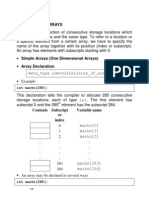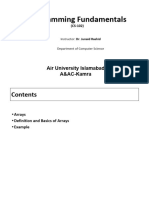0% found this document useful (0 votes)
7 views37 pagesArrays in C++
The document discusses the use of arrays in C++ to manage multiple similar data items, illustrating how arrays simplify finding maximum values compared to using individual variables. It provides examples of declaring and initializing arrays, highlights the importance of constant integer expressions for array sizes, and demonstrates potential issues with exceeding array bounds. Additionally, it covers compiler behavior regarding variable-sized arrays and the implications of accessing out-of-bounds elements.
Uploaded by
mblola2020Copyright
© © All Rights Reserved
We take content rights seriously. If you suspect this is your content, claim it here.
Available Formats
Download as PDF, TXT or read online on Scribd
0% found this document useful (0 votes)
7 views37 pagesArrays in C++
The document discusses the use of arrays in C++ to manage multiple similar data items, illustrating how arrays simplify finding maximum values compared to using individual variables. It provides examples of declaring and initializing arrays, highlights the importance of constant integer expressions for array sizes, and demonstrates potential issues with exceeding array bounds. Additionally, it covers compiler behavior regarding variable-sized arrays and the implications of accessing out-of-bounds elements.
Uploaded by
mblola2020Copyright
© © All Rights Reserved
We take content rights seriously. If you suspect this is your content, claim it here.
Available Formats
Download as PDF, TXT or read online on Scribd
/ 37
























































































